Marchés
Lors de la conception d’une intervention humanitaire et de la prise de décisions quant à l’utilisation des transferts monétaires, l’analyse générale des options de réponse doit inclure une analyse de marché. Il est prouvé qu’offrir un soutien ciblant le fonctionnement des marchés accélère la reprise et accroît la résilience dans les zones affectées par une catastrophe.
De nombreuses organisations ont investi dans la mise au point d’outils visant à faciliter l’analyse de marché et réfléchissent à la mise en place de programmes basés sur les marchés plus holistiques. Elles envisagent des interventions tirant profit du marché (basées notamment sur des transferts monétaires aux populations affectées), ainsi que des interventions soutenant directement les marchés (comme l’octroi de subventions conditionnelles aux vendeurs/euses pour la remise en condition du marché).
Initiatives associées
Contenu associé

1.2 Introduction à l’analyse de marché
Cours
Ce cours de 30 minutes offre une introduction à l’analyse de marché pour les contextes d’urgence. Il contient des contributions d'experts dans ce domaine. Ce cours a été développé en collaboration avec l'International Rescue Committee et le CALP Network et grâce au financement d’USAID/OFDA et de l’Agence Suisse pour le Développement et la Coopération. Il est destiné aux...

2.4 Un guide pratique pour l’analyse de marché
Cours
Ce cours en ligne de 3.5 heures vise à fournir aux équipes qui conduiront des analyses de marchés en contextes humanitaires une compréhension approfondie de la théorie et des étapes à suivre afin de leur permettre de comprendre le pourquoi et le comment du processus à suivre. Les participants seront guides à travers un scenario d'analyse de marchés d'urgence. Ce cours s'appuie sur...
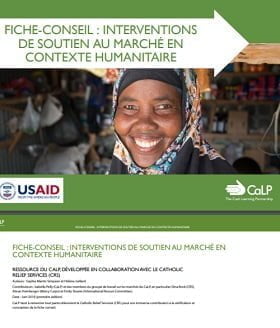
Fiche-Conseil : Interventions de soutien au marché en contexte humanitaire
Guides et outils
La fiche conseil définit le programme de soutien au marché en contexte humanitaire et le décrit dans la pratique. Elle permet aux praticiens humanitaires d’envisager systématiquement des interventions de soutien au marché, parallèlement à d’autres activités du programme. Le champ d’application comprend des interventions de soutien au marché axées sur l’offre/la disponibilité...
Thematic lead
Latest

Des données simplifiées. Une protection amplifiée. Une conversation essentielle pour les professionnel-le-s dans le domaine des transferts monétaires.
Webinaire
Contexte À une époque où l’aide humanitaire prend une forme de plus en plus numérique, la pandémie imposant des transferts à distance, et où les données sont utilisées comme des marchandises et des armes, comment protéger les personnes que nous souhaitons aider ? Plus que jamais, les...

COVID-19 and the Emergency Social Safety Net (ESSN) and Conditional Cash Transfers for Education (CCTE) programmes
Guidelines and Tools
FCDO Turkey commissioned SPACE to assess the impact of COVID-19 on the principal cash vehicles active in Turkey: Emergency Social Safety Net (ESSN) and Conditional Cash Transfers for Education (CCTE) programmes, both funded by the EU through the EUR 6 billion Facility for Refugees in Turkey (FRiT)...

Inclusive Information Systems for Social Protection: Intentionally Integrating Gender and Disability
Policy paper
Digital information systems serving the social protection sector, and especially social assistance, are increasingly prominent and will continue to be, as is the case within all other sectors. “Why? Because the ability of a country to care for its people and respond to their lifecycle needs depends on...
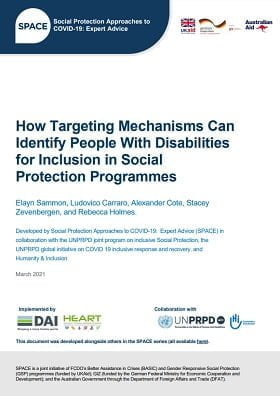
How Targeting Mechanisms Can Identify People With Disabilities for Inclusion in Social Protection Programmes
Guidelines and Tools
Persons with disabilities have worse education, health and employment outcomes and are more vulnerable to shocks than persons without disabilities. At the same time, they are less likely to be enrolled in social protection programmes, including those for which they are eligible. They can face significant...

Data simplified. Protection amplified. An essential conversation for CVA practitioners.
Webinar recording
As humanitarian aid becomes increasingly remote and digitized in the pandemic, and data is both a commodity and a weapon, how do we protect those we aim to help? More than ever, data must be treated as an extension of the individual and as an essential part of humanitarian protection. the CALP...

Étude de cas : Partage responsable des données avec les gouvernements
Rapport
Ce document étudie diverses stratégies que les acteurs des transferts monétaires peuvent mettre en oeuvre pour atténuer les préjudices réels et potentiels auxquels le partage de données sur les bénéficiaires de transferts monétaires avec les gouvernements pourrait exposer les populations...

Étude de cas : gestion responsable des données et ciblage numérique à distance pendant la Covid-19
Rapport
La pandémie de COVID-19 a éclaté début 2020 et a mis le monde sens dessus dessous. Fin 2020, l’OMS recensait quelque 75 millions de cas confirmés à travers le monde et 1,7 million de décès1. Contrairement à une crise « normale », la pandémie est mondiale par nature, touchant chaque pays à...

Boîte à outils sur la gestion responsable des données : Guide à destination des professionnel-les du secteur des transferts monétaires
Rapport
En 2016, ELAN a créé le 2016 Data Starter Kit, l’une des premières boîtes à outils consacrées à la gestion responsable des données dans les secteurs humanitaire et du développement. Le Data Starter Kit est une ressource centrale pour la communauté CaLP et plus généralement pour les...
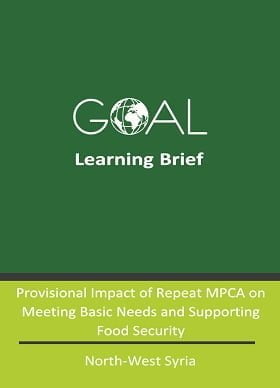
Provisional Impact of Repeat MPCA on Meeting Basic Needs and Supporting Food Security in North-West Syria
Policy paper
In the North-West Syria response, cash assistance is mostly once-off or else for a maximum of 3 months. GOAL Syria is delivering a large-scale value voucher or food kit response to support food security needs. However, needs assessment repeatedly show that households have high non-food needs along with...

Brief: Towards shock-responsive social protection: lessons from the COVID-19 response in Ethiopia
Policy paper
COVID-19 and national and international measures to curb its spread, may have pushed 15 million more people below the poverty line in Ethiopia. This policy brief draws on key learnings from the Ethiopia country case study, focused on the social protection response to COVID-19 and identifies...
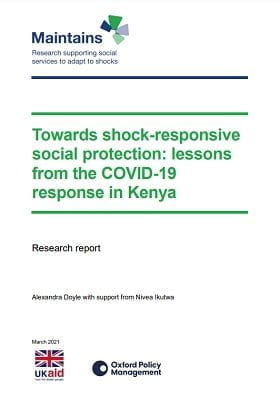
Towards shock-responsive social protection: lessons from the COVID-19 response in Kenya
Report
The stringent lockdown measures and global economic slowdown, due to COVID-19, are likely to push more than 2 million people into poverty in Kenya. This study documents the Government of Kenya’s social protection response to mitigate the negative impact of the pandemic on vulnerable households and...

Towards shock-responsive social protection: lessons from the COVID-19 response in Pakistan
Report
The stringent lockdown measures and global economic slowdown, due to COVID-19, are likely to increase the poverty rate in Pakistan by 35 percentage points in urban areas and 32 percentage points in rural areas. The report documents the Government of Pakistan’s social protection response to mitigate the...

Brief: Towards shock-responsive social protection: lessons from the COVID-19 response in Pakistan
Policy paper
This policy brief draws on key learnings from the Pakistan research report and microsimulation report on the social protection responses to COVID-19. The brief provides analysis of the factors that enabled and constrained the effectiveness of the delivery of social protection in Pakistan and also provides...
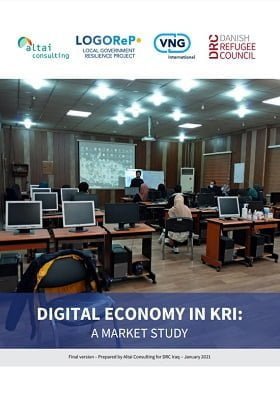
Digital economy in KRI: A market study
Report
The objective of the research was to assess the opportunities and challenges for digital technologies to promote economic growth and employment creation for host communities and refugees in Kurdistan Region of Iraq. The findings of this report will then be used to design curricula for digital skills which...

Évaluation formative de la Communauté de pratique sur les transferts sociaux monétaires en Afrique francophone (2014-2019)
Rapport
La Communauté de pratique (CoP) sur les transferts sociaux monétaires en Afrique a été lancée par la Banque Mondiale en 2011. À cette période, plusieurs pays d’Afrique de l’Est et australe s’appuyaient sur des données probantes issues d’évaluations d’impact pour déployer des programmes...

Soutenir les liens entre les transferts monétaires humanitaires et les systèmes nationaux de protection sociale
Rapport
Cette fiche-conseils vise à soutenir les efforts de coordination nationale afin de renforcer l’engagement entre les groupes de coordination humanitaire qui mettent en oeuvre les transferts monétaires (TM) et les acteurs et groupes de coordination existants en matière de protection sociale ou de...
The CALP Network Technical Advisory Group (TAG) Quarterly Meeting
Members event
This is the first TAG meeting of 2021. The TAG helps shape and steer the CALP Network’s technical and policy priorities within the overall strategic vision for the network, and is comprised of 20-30 individuals from member organisations.

Cash Hub Webinar 18: Cash and Data Protection – The Use of Cash & Markets in the Red Cross Red Crescent Movement
Members event
The webinar will focus on Cash and Voucher Assistance (CVA) & Data Protection. As we scale up our use of CVA, collecting and processing of personal data must also increase. Considering data protection is essential for protecting the vulnerable, building trust and implementing CVA safely and at scale....

Sudan – Gedaref Joint Cash Risk assessment
Report
Since the crisis in the Tigray region of Ethiopia in November 2020 over 60,000 people have sought refuge in neighbouring Sudan and were mostly accommodated in camps re-established in Gedaref State. Cash is has been utilised as a response modality and is being considered further by several agencies. This...

Linking the Rapid Response Mechanism to the Provision of Cash Assistance and Women’s Protection: UNFPA Yemen Case Study
Report
The rapid response mechanism (RRM) in Yemen aims to provide a minimum package of critical life-saving assistance for newly displaced persons. This is led by UNFPA in partnership with WFP and UNICEF. The RRM serves as an entry point for the provision of multi-purpose cash assistance and to address...
